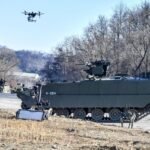Hana Bank’s trading floor in Seoul on April 16, 2024 (File photo by Lim Dae-chul)
South Koreans parked a record 350 trillion won ($259 billion) in cash-equivalents such as money market funds (MMFs) as they failed to find investment targets in the local stock and property markets amid uncertainties in interest rate cuts and government policies.
The total balance of MMFs that invest in short-term debt securities such as treasury bonds, cash management accounts (CMAs) that act as combined savings and checking accounts providing interest and having options for investing, and investor deposits have grown by 48 trillion won this year to an all-time high of 349.9 trillion won as of May 7, according to the Korea Financial Investment Association. The combined balance eased a bit to 344.5 trillion won as of May 13, the association’s data showed.
That came as South Korea’s institutional and retail investors have dumped nearly 20 trillion won in domestic stocks so far this year as hopes for the country’s measures to push up corporate values and abolish financial investment gain taxes waned, financial market industry sources said. The uncertainties over interest rate cuts also refrained investors from seeking alternative assets such as real estate, they added.
“Distrust of the value-up program, which encourages listed companies to implement shareholder-friendly policies, contributed to the selling spree,” said a foreign investment bank research head.
Earlier this year, South Korean President Yoon Suk Yeol pledged to bolster the stock market with a government-led policy, the so-called corporate value-up program. Yoon also said the country plans to scrap capital gains taxes on financial investments to revitalize the lackluster domestic financial market and help individual investors grow their assets.
DISBELIEF
South Korea’s institutional investors and individuals have sold a net 10.3 trillion won and a net 8.3 trillion won, respectively, so far this year as of May 14, according to the Korea Exchange.
Financial institutions mainly dumped semiconductor stocks and shares with low price-earnings ratios (PERs). They unloaded 4.6 trillion won in the world’s largest memory chipmaker Samsung Electronics Co., 1.2 trillion won in its smaller rival SK Hynix Inc., 415 billion won in Kia Corp. and 279 billion won in Samsung C&T Corp.
Retail investors unloaded 3.9 trillion won in Hyundai Motor Co., 904 billion won in Samsung C&T, 674 billion won in Kia, 615 billion won in KB Financial Group, 434 billion won in Hana Financial Group and 406 billion won in Shinhan Financial Group.
Most of those stocks have risen 10-30% since the country announced the value-up scheme. The sell-off indicated investors may have focused on profit-taking from their gains instead of buying further.
UNCERTAINTIES
The authorities on May 2 unveiled some details for the program including a recommendation that listed companies set up and announce plans to boost their enterprise values through regulatory filings. The government is considering cuts in corporate taxes and dividend income taxes for companies with larger dividends, which needs to amend laws.
Lawmakers may not approve it since the opposition parties, which control the majority of the parliament, object to the amendment.
It is also uncertain for the government to abolish financial investment gains taxes set to be reintroduced in 2025.
The country planned to impose a tax rate of 20-25% on investors who make capital gains of more than 50 million won within a year of their investments in financial products such as stocks, bonds, funds and derivatives. The taxes were supposed to be implemented in 2023 but were postponed by two years until 2025.
South Korean President Yoon Suk Yeol (File photo, courtesy of Yonhap)
Yoon earlier this year announced his administration would abolish the taxes but the main opposition Democratic Party, which won a landslide victory in the latest general election, urged the government to implement the rule as scheduled.
“Once the capital gain taxes are implemented, funds of some 150 trillion won will leave the local stock markets,” said the Korea Corporate Governance Forum.
Those uncertainties further deteriorated investor sentiment, which has already been soured by expectations that the US Federal Reserve and the Bank of Korea are unlikely to cut interest rates soon.
By Ik-Hwan Kim, Hyun-Ju Jang and Jeong-Cheol Bae
lovepen@hankyung.com
Jongwoo Cheon edited this article.















